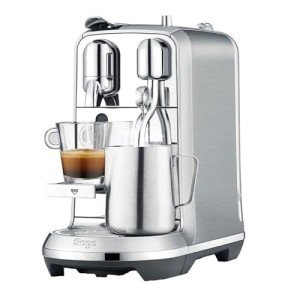Home Use Espresso Machines: A Comprehensive Guide
Espresso machines have become a staple in many households as coffee lovers look for to replicate café-quality brews in the comfort of their kitchen areas. The increase in popularity has caused a diverse market filled with numerous models, functions, and prices. Espresso Maker Online intends to provide a helpful introduction of home use espresso machines, assisting readers navigate their alternatives effectively.
Comprehending Espresso Machines
Espresso machines work by requiring warm water through finely-ground coffee under high pressure, leading to a concentrated coffee drink known as espresso. There are a number of kinds of espresso machines classified based on their brewing methods and level of automation. The most common types include:
- Manual Espresso Machines: These need the user to control the pressure and water circulation, enabling a more hands-on coffee-making experience.
- Semi-Automatic Espresso Machines: These offer automatic control over water pressure, while the user by hand grinds and tamps the coffee.
- Automatic Espresso Machines: With the push of a button, these machines immediately control the circulation of water, making it easier to brew espresso with consistent outcomes.
- Super-Automatic Espresso Machines: These all-in-one machines handle grinding, tampering, developing, and even milk frothing, making them ideal for users trying to find convenience.
- Pill or Pod Machines: These use pre-packaged coffee pods to create espresso with minimal effort, however they restrict option in brewing techniques and flavors.
Table: Comparison of Espresso Machine Types
| Type | Control Level | Reduce of Use | Cleaning Level | Perfect For |
|---|---|---|---|---|
| Manual | User-controlled | Moderate | High | Coffee purists |
| Semi-Automatic | Partial automation | Moderate | Moderate | Home baristas |
| Automatic | Fully automated | Easy | Low | Hectic people |
| Super-Automatic | Fully automated | Very easy | Very low | Convenience applicants |
| Capsule/Pod | Totally automated | Very easy | Really low | Casual drinkers |
Secret Features to Consider
When picking a home use espresso machine, it's important to consider different functions that can substantially impact the quality of espresso and user experience.
- Pressure: Look for machines that provide at least 9 bars of pressure, as this is thought about optimum for brewing espresso.
- Boiler Systems: Single vs. dual boiler systems identify temperature stability and the ability to brew espresso and steam milk concurrently.
- Grinder: Integrated grinders enable freshly ground coffee, which improves taste. Think about machines with adjustable grind settings.
- Milk Frother: For those who delight in cappuccinos and lattes, a built-in steam wand or automatic frother is vital.
- Size and Design: Consider your cooking area area and aesthetic preferences. Machines can be found in numerous sizes, from compact to big setups.
- Price: Home espresso machines can range from a few hundred to a number of thousand dollars, so it's important to establish a budget before exploring alternatives.
Benefits and drawbacks of Home Use Espresso Machines
| Pros | Cons |
|---|---|
| Convenience of developing coffee in your home | Preliminary financial investment can be high |
| Quality of espresso is frequently remarkable | Needs some skill, specifically with manual machines |
| Capability to explore tastes | Maintenance and cleansing can be labor-intensive |
| Can save money in the long run | Not all machines will suit every coffee preference |
Upkeep and Cleaning Tips
Maintaining an espresso machine is important for lengthening its life and making sure consistent brew quality. Here are some helpful ideas:
- Regular Descaling: Minerals from water can develop in the machine. Descale every 1-3 months, depending on water firmness.
- Daily Cleaning: Rinse portafilters, baskets, and steam wands after each use to prevent coffee oils from developing residue.
- Use Filtered Water: This can help lower mineral accumulation and enhance the taste of coffee.
- Change Gaskets and Seals: These components may wear with time and needs to be changed to keep pressure and performance.
- Read the Manual: Each machine has specific care instructions; following these will guarantee longevity.
Frequently Asked Questions About Home Use Espresso Machines
Q1: What is the very best budget espresso machine?The best budget espresso machine often depends on private requirements, however models like the DeLonghi EC155 or the Breville Bambino are popular among users for supplying terrific worth. Q2: How long do home espresso machines usually last?With correct upkeep, home espresso machines can last anywhere from 5 to 15 years, depending on the quality of the machine and frequency of use. Q3: Can I make coffees and lattes with any espresso machine?While most espresso machines can make coffees and lattes, having a reputable
steam wand or frother is important for accomplishing the right milk texture.
Q4: Are super-automatic machines worth the investment?For those who prioritize benefit and fast developing, super-automatic machines can be worth the investment, though they might do not have some customizability in brew strength and taste. Q5: What types of coffee beans are best for espresso?While individual preference plays a role, beans identified as" espresso "blends are normally roasted darker, producing abundant tastes and a creamy texture when brewed.
Buying a home espresso machine can change the daily coffee routine into something special, elevating home brews to café quality. By comprehending the different types of machines, essential functions to think about, maintenance requirements, and weighing the
pros and cons, consumers can make informed decisions that fit their individual preferences. As the espresso culture continues to grow, no matter the choice, every brew can be a scrumptious experience waiting to be enjoyed.

